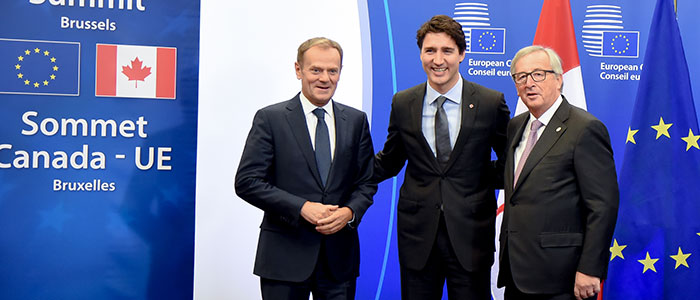CETA signing.jpg

European Council president Donald Tusk, Canadian prime minister Justin Trudeau and European Commission president Jean-Claude Juncker after signing the EU-Canada trade deal known as CETA in Brussels yesterday. © European Union, 2016
The Comprehensive Economic and Free Trade Agreement, known as CETA, was signed yesterday by the EU’s top officials and Canadian prime minister Justin Trudeau at a summit in Brussels.
The deal, which removes 99% of tariffs, had previously been thought dead after facing staunch opposition from the public and some member states, and negotiations on all of its 27 chapters hit deadlock.
But yesterday European Commission president Jean-Claude Juncker said a “new chapter” had opened in relations between the people of the EU and Canada.
“More than half a billion people on both sides of the Atlantic will enjoy new opportunities,” he said. “For many people, it will mean new and better jobs.”
CETA’s supporters argued the deal would increase EU-Canada trade by 20%, resulting in a €12bn ($13bn) and C$12bn ($9bn) boost to the EU and Canadian economies respectively.
The commission said EU exporters would benefit from savings of more than €500m ($547.8m) per year, because of simpler, cheaper tests on exports. The deal would make it easier for professionals to move between the two countries, it said.
“This is how we can shape globalisation – through progressive, state-of-the-art agreements that uphold our values and set new standards for global commerce,” said commissioner for trade Cecilia Malmström.
“Trade simply works, and we know that from experience. When we get rid of unnecessary costs and overlapping bureaucracy, companies will try out new markets and hire more people.”
Until yesterday, however, not all member states were convinced. The primary opposition came from Belgium, where regional governments were concerned about opening up agriculture industries to Canadian competition and a proposed system for settling disputes between governments and foreign investors.
Belgium’s objections to certain provisions of the deal continued to derail the process as late as Thursday, when a scheduled signing session had to be cancelled because the country’s Federal government could not give its consent due to opposition from its Wallonia region.
The dispute resolution system CETA contains, which was criticised by Belgium’s Magnette regional government, is also a major point of contention for the EU populace.
It would see the creation of an exclusive trade court, which critics say would enable private companies to sue governments for profits lost as a result of laws that, for example, protect people or the environment.
Amid a worldwide backlash against globalisation and free trade, the public turned on CETA as yet another massive, corporate power grab.
As support for the deal and negotiations faltered, the commission had tried to fast-track CETA by removing the need for ratification from each EU member state. However, it quickly backtracked on this after coming under pressure from France and Germany.
Therefore, while the deal has been formally signed, it will not come into force until all of the EU’s 27 member state parliaments have agreed to it.
Nick Dearden, director of Global Justice Now, said this means CETA is a “ticking time bomb” – but Belgium’s Wallonia parliament at least is promising to veto the deal when it gets a formal vote unless there are substantial changes.
“CETA would open up our government to a deluge of court cases by North American multinational corporations and investors. It presents a threat to our ability to protect the environment, to protect the public and limit the power of big banks. It is thoroughly undemocratic and must be stopped,” he said.
Last week, the United Nation’s human rights expert also dubbed the deal “flawed” and said it should not be signed or ratified without a referendum in each country concerned.













